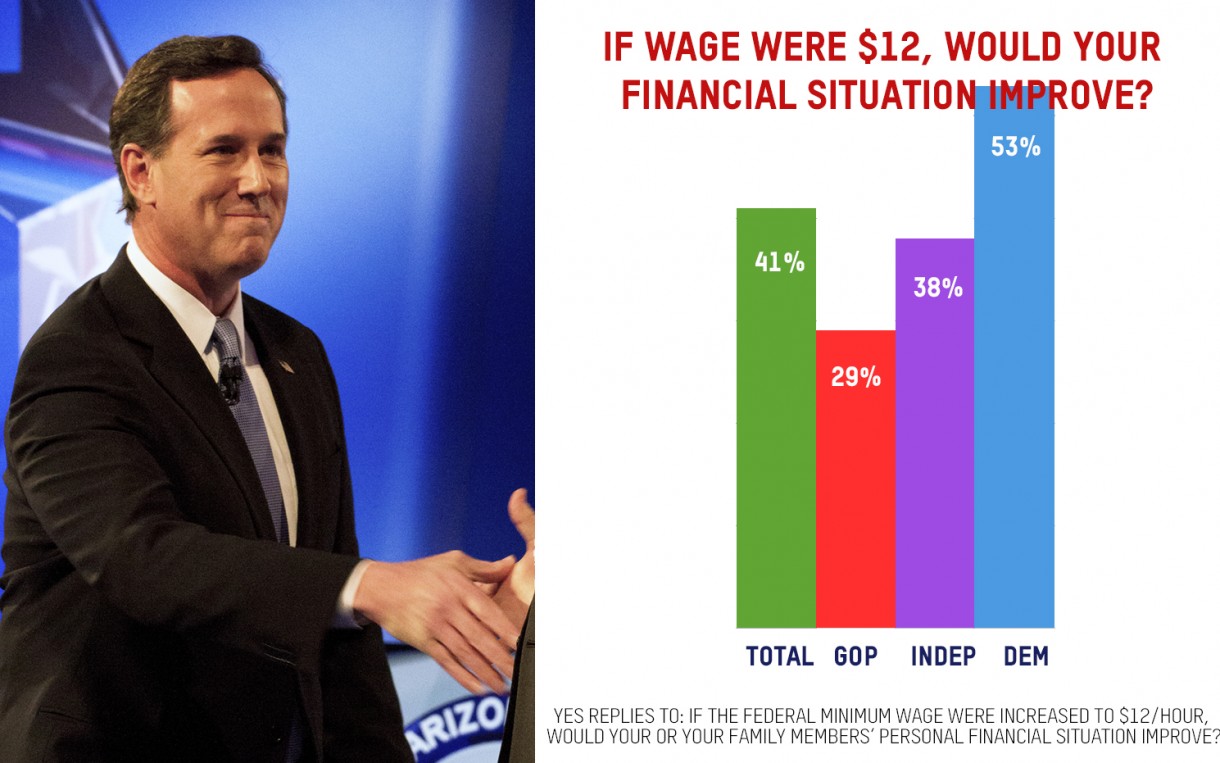On the minimum wage, Santorum has it right
 Photo: Daniel Raustadt/Dreamstime.com.
Infographic: Oxfam America
Photo: Daniel Raustadt/Dreamstime.com.
Infographic: Oxfam America
Too many GOP candidates shun an increase in the federal minimum wage – even though GOP voters support it in increasing numbers.
Last night at the CNN Republican Presidential Debate, former Senator Rick Santorum delivered an impassioned plea for an increase in the federal minimum wage, calling it good policy and good politics for the Republican Party. He said that as long as the Republican Party is willing to support help for businesses (bailouts and tax preferences), but not support the wages of hardworking Americans at the bottom of the income scale, he could not make the case for the Party to the American public.
In saying this, he was speaking to the heart of the majority of the American public – voters of all parties including GOP voters themselves.
Still, some commentators were surprised to hear this coming from the Republican debate stage. And that’s too bad. The media continues to falsely paint the minimum wage as a strictly partisan issue in the media—and it’s a gross misrepresentation.
In fact, new polling from respected Republican pollster John McLaughlin for Oxfam shows that voters of all parties strongly support an increase in the federal minimum wage. Most GOP voters in seven important swing states (75%) support a raise. He even found that a majority of members of the GOP Iowa Caucus polled (58%) and likely New Hampshire GOP Primary voters (59%) favor some kind of an increase (when asked about proposals to increase the wage to $9, $10, $12, or $15 over time).
Overall, our poll found almost nine out of ten (87%) of swing state voters support an increase, including strong support from independents, women, Latinos, and other voting blocks who will be key to winning the presidency. While some Democratic proposals – like increasing the wage to $12 or $15 – may not have the support of a majority of Republican voters, smaller increases to $9 or $10 draw solid support. This falls in line with cross tabulations from numerous other national polls showing majority support for more modest increases.
Still, some polls come up with more equivocal support; but these may be less accurate. For instance, a Marist survey cited in the media did not ask about more modest increases, and failed to use any number at all in asking whether voters support a minimum wage increase. With most of the media coverage focusing on city-led efforts for a $15 increase, you can see how poll respondents could react in opposition to these higher dollar proposals as seen on TV.
Even among Republican voters who do not favor an increase, their opposition is often weak. It’s no surprise that GOP pollster McLaughlin advises candidates to revise their stance on the minimum wage: “There is very little benefit to running against the minimum wage.”
Even in the early nominating states, only 13 percent of GOP voters take a hardline stance that they oppose an increase, and could not vote for a candidate supporting an increase. That number shrinks to 2.3 percent among general election swing states voters. Not exactly a winning coalition.
So far, two other Republican candidates have joined Senator Santorum in calling for a wage hike. Last night, Dr. Ben Carson reiterated his support for an increased federal minimum wage; and in recent weeks, Ohio Governor John Kasich said he could support a reasonable increase. But the other candidates have yet to warm up to it.
In his remarks, Santorum went on to bust another common myth about GOP voters. He said Republicans often put the needs of small business owners over the needs of wage earners, despite the fact that wage earners represent a much bigger block of voters and the American public. He asked, “How are you going to win, ladies and gentlemen? How are we going to win if 90 percent of Americans don’t think we care at all about them and their chance to rise?”
It turns out almost half (41%) of likely voters in the seven most important Presidential swing states (Colorado, Florida, Iowa, Ohio, New Hampshire, Nevada, and Virginia) report they or a family member is a low wage worker who could benefit from a proposed $12 minimum wage in Oxfam’s poll. These voters outnumber others who say they or a family member owns a small business or an agricultural business by a margin of three to one! Still, the early nominating states are a slightly different story. In Iowa, due to the significant number of agricultural businesses, more GOP voters fall into the business than low wage worker categories; but in the New Hampshire Republican primary, they are roughly equal. Even in the primaries, voters impacted by low wage work still represent a sizable block of GOP voters that should not be overlooked.
Santorum is right. A poverty level minimum wage continues to harm millions of low wage workers and their families across the country. These Americans, their friends and family want the next President to raise their wages. It is not just the right thing to do economically and morally, but it just happens to be good politics as well.
The question remains: will any more Republican candidates take Senator Santorum’s advice?